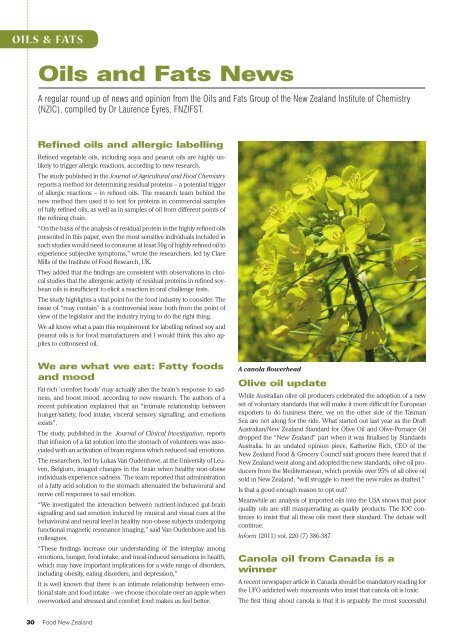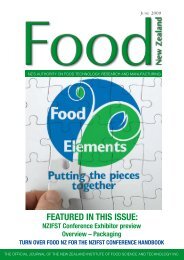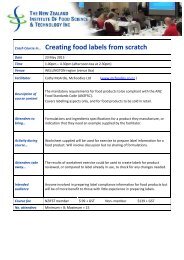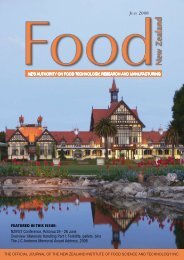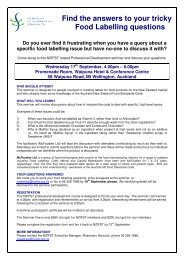featured in this issue - NZIFST - The New Zealand Institute of Food ...
featured in this issue - NZIFST - The New Zealand Institute of Food ...
featured in this issue - NZIFST - The New Zealand Institute of Food ...
Create successful ePaper yourself
Turn your PDF publications into a flip-book with our unique Google optimized e-Paper software.
OILS & FATS<br />
Oils and Fats <strong>New</strong>s<br />
A regular round up <strong>of</strong> news and op<strong>in</strong>ion from the Oils and Fats Group <strong>of</strong> the <strong>New</strong> <strong>Zealand</strong> <strong>Institute</strong> <strong>of</strong> Chemistry<br />
(NZIC), compiled by Dr Laurence Eyres, F<strong>NZIFST</strong>.<br />
Ref<strong>in</strong>ed oils and allergic labell<strong>in</strong>g<br />
Ref<strong>in</strong>ed vegetable oils, <strong>in</strong>clud<strong>in</strong>g soya and peanut oils are highly unlikely<br />
to trigger allergic reactions, accord<strong>in</strong>g to new research.<br />
<strong>The</strong> study published <strong>in</strong> the Journal <strong>of</strong> Agricultural and <strong>Food</strong> Chemistry<br />
reports a method for determ<strong>in</strong><strong>in</strong>g residual prote<strong>in</strong>s – a potential trigger<br />
<strong>of</strong> allergic reactions – <strong>in</strong> ref<strong>in</strong>ed oils. <strong>The</strong> research team beh<strong>in</strong>d the<br />
new method then used it to test for prote<strong>in</strong>s <strong>in</strong> commercial samples<br />
<strong>of</strong> fully ref<strong>in</strong>ed oils, as well as <strong>in</strong> samples <strong>of</strong> oil from different po<strong>in</strong>ts <strong>of</strong><br />
the ref<strong>in</strong><strong>in</strong>g cha<strong>in</strong>.<br />
“On the basis <strong>of</strong> the analysis <strong>of</strong> residual prote<strong>in</strong> <strong>in</strong> the highly ref<strong>in</strong>ed oils<br />
presented <strong>in</strong> <strong>this</strong> paper, even the most sensitive <strong>in</strong>dividuals <strong>in</strong>cluded <strong>in</strong><br />
such studies would need to consume at least 50g <strong>of</strong> highly ref<strong>in</strong>ed oil to<br />
experience subjective symptoms,” wrote the researchers, led by Clare<br />
Mills <strong>of</strong> the <strong>Institute</strong> <strong>of</strong> <strong>Food</strong> Research, UK.<br />
<strong>The</strong>y added that the f<strong>in</strong>d<strong>in</strong>gs are consistent with observations <strong>in</strong> cl<strong>in</strong>ical<br />
studies that the allergenic activity <strong>of</strong> residual prote<strong>in</strong>s <strong>in</strong> ref<strong>in</strong>ed soybean<br />
oils is <strong>in</strong>sufficient to elicit a reaction <strong>in</strong> oral challenge tests.<br />
<strong>The</strong> study highlights a vital po<strong>in</strong>t for the food <strong>in</strong>dustry to consider. <strong>The</strong><br />
<strong>issue</strong> <strong>of</strong> “may conta<strong>in</strong>” is a controversial <strong>issue</strong> both from the po<strong>in</strong>t <strong>of</strong><br />
view <strong>of</strong> the legislator and the <strong>in</strong>dustry try<strong>in</strong>g to do the right th<strong>in</strong>g.<br />
We all know what a pa<strong>in</strong> <strong>this</strong> requirement for labell<strong>in</strong>g ref<strong>in</strong>ed soy and<br />
peanut oils is for food manufacturers and I would th<strong>in</strong>k <strong>this</strong> also applies<br />
to cottonseed oil.<br />
We are what we eat: Fatty foods<br />
and mood<br />
Fat-rich ‘comfort foods’ may actually alter the bra<strong>in</strong>’s response to sadness,<br />
and boost mood, accord<strong>in</strong>g to new research. <strong>The</strong> authors <strong>of</strong> a<br />
recent publication expla<strong>in</strong>ed that an “<strong>in</strong>timate relationship between<br />
hunger/satiety, food <strong>in</strong>take, visceral sensory signall<strong>in</strong>g, and emotions<br />
exists”.<br />
<strong>The</strong> study, published <strong>in</strong> the Journal <strong>of</strong> Cl<strong>in</strong>ical Investigation, reports<br />
that <strong>in</strong>fusion <strong>of</strong> a fat solution <strong>in</strong>to the stomach <strong>of</strong> volunteers was associated<br />
with an activation <strong>of</strong> bra<strong>in</strong> regions which reduced sad emotions.<br />
<strong>The</strong> researchers, led by Lukas Van Oudenhove, at the University <strong>of</strong> Leuven,<br />
Belgium, imaged changes <strong>in</strong> the bra<strong>in</strong> when healthy non-obese<br />
<strong>in</strong>dividuals experience sadness. <strong>The</strong> team reported that adm<strong>in</strong>istration<br />
<strong>of</strong> a fatty acid solution to the stomach attenuated the behavioural and<br />
nerve cell responses to sad emotion.<br />
“We <strong>in</strong>vestigated the <strong>in</strong>teraction between nutrient-<strong>in</strong>duced gut-bra<strong>in</strong><br />
signall<strong>in</strong>g and sad emotion <strong>in</strong>duced by musical and visual cues at the<br />
behavioural and neural level <strong>in</strong> healthy non-obese subjects undergo<strong>in</strong>g<br />
functional magnetic resonance imag<strong>in</strong>g,” said Van Oudenhove and his<br />
colleagues.<br />
“<strong>The</strong>se f<strong>in</strong>d<strong>in</strong>gs <strong>in</strong>crease our understand<strong>in</strong>g <strong>of</strong> the <strong>in</strong>terplay among<br />
emotions, hunger, food <strong>in</strong>take, and meal-<strong>in</strong>duced sensations <strong>in</strong> health,<br />
which may have important implications for a wide range <strong>of</strong> disorders,<br />
<strong>in</strong>clud<strong>in</strong>g obesity, eat<strong>in</strong>g disorders, and depression,”<br />
It is well known that there is an <strong>in</strong>timate relationship between emotional<br />
state and food <strong>in</strong>take – we choose chocolate over an apple when<br />
overworked and stressed and comfort food makes us feel better.<br />
A canola flowerhead<br />
Olive oil update<br />
While Australian olive oil producers celebrated the adoption <strong>of</strong> a new<br />
set <strong>of</strong> voluntary standards that will make it more difficult for European<br />
exporters to do bus<strong>in</strong>ess there, we on the other side <strong>of</strong> the Tasman<br />
Sea are not along for the ride. What started out last year as the Draft<br />
Australian/<strong>New</strong> <strong>Zealand</strong> Standard for Olive Oil and Olive-Pomace Oil<br />
dropped the “<strong>New</strong> <strong>Zealand</strong>” part when it was f<strong>in</strong>alised by Standards<br />
Australia. In an undated op<strong>in</strong>ion piece, Kather<strong>in</strong>e Rich, CEO <strong>of</strong> the<br />
<strong>New</strong> <strong>Zealand</strong> <strong>Food</strong> & Grocery Council said grocers there feared that if<br />
<strong>New</strong> <strong>Zealand</strong> went along and adopted the new standards, olive oil producers<br />
from the Mediterranean, which provide over 95% <strong>of</strong> all olive oil<br />
sold <strong>in</strong> <strong>New</strong> <strong>Zealand</strong>, “will struggle to meet the new rules as drafted.”<br />
Is that a good enough reason to opt out?<br />
Meanwhile an analysis <strong>of</strong> imported oils <strong>in</strong>to the USA shows that poor<br />
quality oils are still masquerad<strong>in</strong>g as quality products. <strong>The</strong> IOC cont<strong>in</strong>ues<br />
to <strong>in</strong>sist that all these oils meet their standard. <strong>The</strong> debate will<br />
cont<strong>in</strong>ue.<br />
Inform (2011) vol. 220 (7) 386-387<br />
Canola oil from Canada is a<br />
w<strong>in</strong>ner<br />
A recent newspaper article <strong>in</strong> Canada should be mandatory read<strong>in</strong>g for<br />
the UFO addicted web miscreants who <strong>in</strong>sist that canola oil is toxic.<br />
<strong>The</strong> first th<strong>in</strong>g about canola is that it is arguably the most successful<br />
30<br />
<strong>Food</strong> <strong>New</strong> <strong>Zealand</strong>


